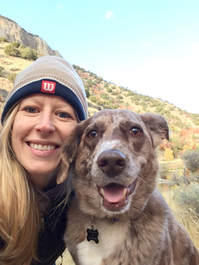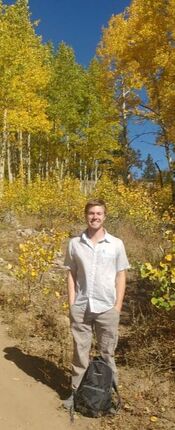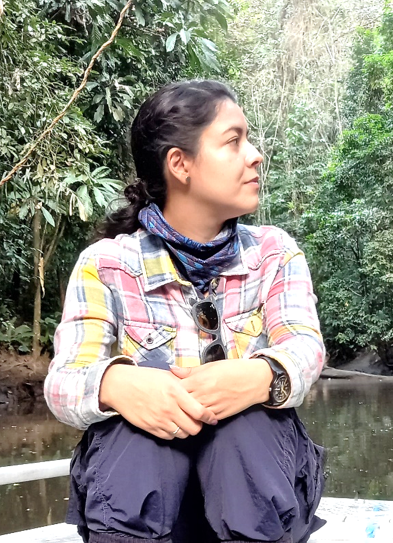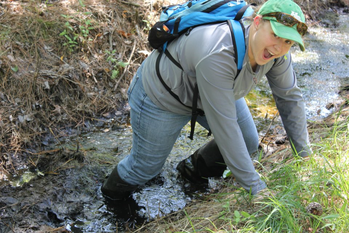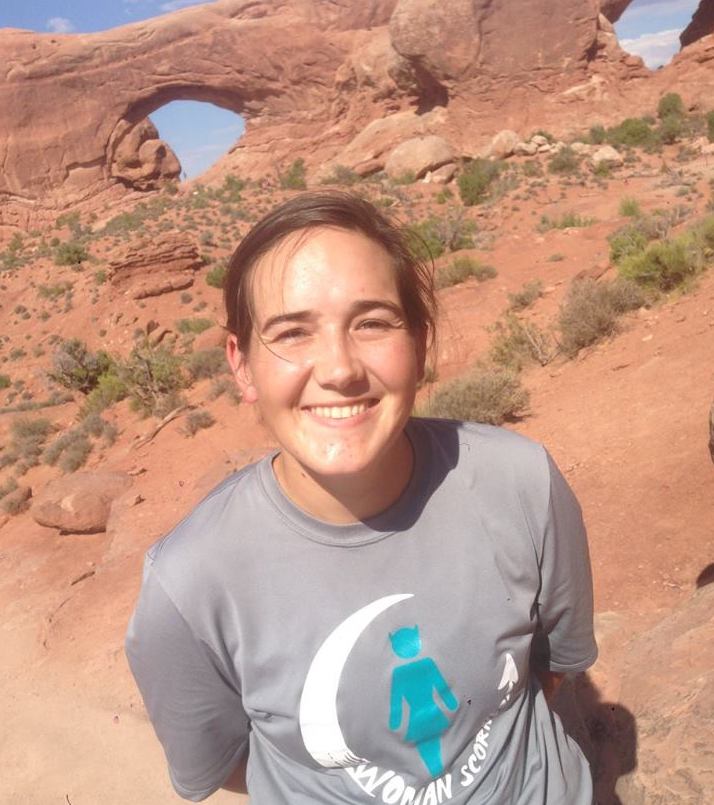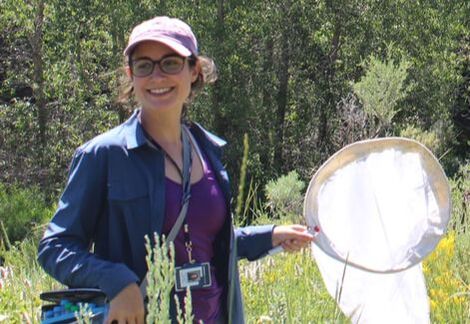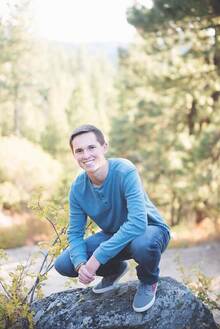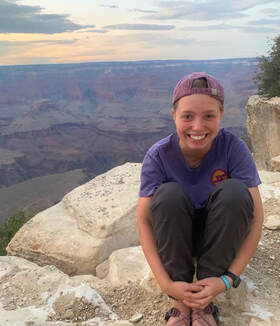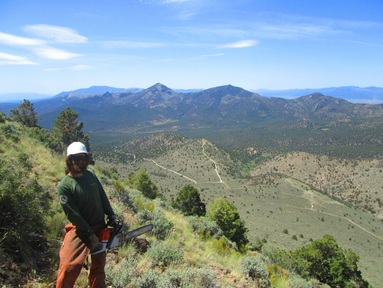|
Karen M. Kapheim
she/her/hers Associate Professor Department of Biology Utah State University I learned about research while working in Kay Holekamp's lab as an undergraduate at Michigan State University. After a short stint as a zookeeper, and a couple field jobs, I went to graduate school at UCLA. My PhD research was co-advised by Peter Nonacs and Bob Wayne, where I made the transition from carnivores to bees. I followed this with a post-doc in Gene Robinson's lab at UIUC, where I got into comparative genomics. I started my lab at Utah State University in 2014. I see mentoring students and building a supportive lab environment as one of the most important (and favorite) parts of my job. |
CURRENT LAB MEMBERS (alphabetical)
|
Tim Delory, Ph.D. student
he/him/his I received my B.S. in biology and mathematics from Western State Colorado University in December 2017. I was first exposed to research in social insects in the summer of 2016, where I had the opportunity to work under the guidance of Dr. Olav Rueppell. We characterized and compared the frequency and variation of meiotic recombination events across several lineages of honeybees using informatic methods. In addition to research related to social insects, I had the privilege to work on constructing a pinon-juniper forest simulation with my adviser Dr. Jonathan Coop at WSCU, where we used a blend of field work and statistical simulation to asses regenerative capacities of forests in high burn severity ecosystems. Since learning about hymenopteran societies and their genetic architecture, I have been captivated by the concepts and challenges related to understanding the emergence of castes, and the dynamics of insect social complexity as a whole. I have also enjoyed the synergey of using informatic, theoretical, and experimental approaches in biological research, and hope to continue to do so. Broadly, my current research interests are concerned with evaluating the presence and impact of intragenomic conflict in socially polymorphic hymenopterans using integrative approaches. |
|
Ana Gutierrez, Ph.D. student
she/her/hers I achieved my degree in biology from the University of Antioquia in 2016. I developed my degree work with speciation in the Diglossa carbonaria complex. After graduation, I worked as a research assistant and intern at Smithsonian Tropical Research Institute in Panama on several projects with Ficus pollinating wasps and chemical ecology in Megalopta genalis, and developed my own project on chemical communication between Clusia floral resins and stingless bees. I started my Ph.D. at the Kapheim Lab in 2022 and I am studying the trade-off between reproduction and immunity in Megalopta genalis as a first objective, and subsequently I will be studying the role of floral and plant resins in the evolution of morphological and physiological characters of workers in stingless bees. |
|
Mallory A. Hagadorn, Ph.D. student
she/her/hers I received my B.S. in Biology from Salisbury University in December 2012. Early on in my scientific career I became interested in taxonomy, entomology, and insect ecology. Working with Dr. Dana Price, my undergraduate research focused on studying Scarab beetle taxonomic classifications and morphological characteristics to generate, and published online, a Quick Guide to the Scarabaeoidea of Maryland. This pictorial reference has been used by both research scholars and citizen scientists to expedite the identification of Maryland scarabs. Spring 2013, I continued my research in the Price Lab while pursuing a Masters in Applied Biology (completed May 2016). The goal of my master’s research was to analyze the biodiversity and distribution of dung beetle populations, as well as, the gut microbial composition of specifically Onthophagus taurus, on organic and conventionally managed cattle farms throughout Maryland. My thesis work was supported by the NSF Graduate Research Fellowship Program and done in collaboration with scientists at the University of Maryland School of Medicine, Institute of Genome Sciences. In the Kapheim Lab, my research interests broadly include understanding how both proximate and ultimate mechanisms influence social behaviors in Hymenopteran insects. More specifically, I am interested in investigating how various social and environmental cues impact neuroplasticity in bees. |
|
Kate Hunter, Ph.D. student
she/her/hers I earned my B.S. in biology and animal ecology in 2014 from Iowa State University. While there I worked with Amy Toth and Jennifer Jandt on Polistes wasp behavior and nutrition. After my undergraduate I worked in the Toth lab for a year as a technician on projects involving honeybee health and pollination services. Throughout these experiences I fell in love with social insects and the prospect of studying behavior with the integration of physiology and molecular methods. In the Kapheim lab I am studying life history trade-offs in the facultatively social neotropical sweat bee, Megalopta genalis to test hypotheses of the evolution of the decoupling of these trade-offs observed in social insects. |
|
Dr. Priscila Santos, Postdoctoral researcher
she/her/hers I received my BS in Biology from Universidade Federal de Uberlandia (2007) where I first got interested in molecular biology, looking for transposable elements in bees with Dr. Rute Magalhaes Brito. I followed to get my master’s (2016) and PhD (2020) still working with bees at LGEA with Dr. Maria Cristina Arias. During that time, I discovered a new world that would become my main interest: diapause. Since then, I have been interested in understanding the molecular mechanisms involved in this distinct phenotype. In the Kapheim lab, we have been interested in understanding the relationship between diapause and the evolution of sociality in bees. I have also been acquiring experience in comparative research, at the genomic and ecological levels, by comparing immune response among wild bees. |
|
Carson Stoker, Research Technician
he/him/his I am an undergraduate studying cellular/molecular biology with minors in computer science and chemistry. I am on track to graduate Spring 2023. After graduation, I plan on attending graduate school in cellular biology and to eventually work as a researcher either in academia or industry. My interests include cell biology, cancer biology, and synthetic biology. In the lab, I'm currently studying how protein nutrition affects the immune system of male bumblebees. Some of my other interests include, hiking, camping, fishing, climbing, and reading. ... |
|
Ren A. Weinstock, M.S. student
they/them/theirs I earned my B.S. in Biology from Tufts University in 2018, where I was first captivated by the study of bee behavior. After graduating, I worked as a field technician for a number of coastal ecology and sea turtle conservation projects around the United States and the Virgin Islands. In addition to gaining a breadth of fieldwork experience, these projects gave me an appreciation for climate-focused research, which I am excited to build on as I return to bee behavior in my graduate research. In the Kapheim Lab, I am studying the effects of global warming on mechanisms of bee sociality, using the socially polymorphic sweat bee, Halictus rubicundus. I am also a fellow in the NSF-funded Climate Adaptation Science program at Utah State University, where I am working with a cohort of graduate students to design integrative research that will contribute to climate resiliency in the Interior West. |
FORMER LAB MEMBERS
J.D. Herndon, M.S. 2020; currently an instructor at Peninsula College
Makenna Johnson, M.S. 2022; currently a research technician at USDA ARS PIRU
Thuy-Tien Thai Lindsay, M.S. 2020; currently a research technician at USDA ARS PIRU
Priscila Ferreira dos Santos, visiting PhD researcher; currently a postdoc at Penn State U
Karlee Eck, Honors capstone researcher; currently a technician at Cytiva
Xavier Haemmerle, Honors capstone researcher; currently a technician at USDA ARS PIRU
Matthew Thompson, Honors capstone researcher
Anna Figgins, undergraduate researcher
Alex Fortin, undergraduate researcher; currently a field technician at USDA ARS PIRU
Mariah Panoussi, undergraduate researcher
Andy Nguyen, undergraduate researcher
Justin Tirrell, undergraduate researcher
Bernardo Gonzalez, undergraduate researcher
Alex Sutherland, undergraduate researcher; currently a graduate student at University of Utah
Tyler Dahl, undergraduate researcher
Andy Nguyen, undergraduate researcher
Tyler Walters, undergraduate researcher; currently in graduate school at Idaho State University
Haley Sorensen, undergraduate researcher
Hannah Curtis, undergraduate researcher
Maggi Jolley, research technician; currently a lab technician at AURP Laboratories
Jenni Sidwell, research technician; currently a graduate student in Europe
Spencer Diehl, undergraduate researcher
Abby Tucker, undergraduate researcher
Adam Singer, undergraduate researcher; currently a lab technician at Oatly Corp.
Maddison Zollinger, research technician; currently a research technician at the USDA ARS PIRU
Dallin Davis, undergraduate researcher
Nate Bee, undergraduate researcher
Mitchell Manwaring, undergraduate researcher
Makenna Johnson, M.S. 2022; currently a research technician at USDA ARS PIRU
Thuy-Tien Thai Lindsay, M.S. 2020; currently a research technician at USDA ARS PIRU
Priscila Ferreira dos Santos, visiting PhD researcher; currently a postdoc at Penn State U
Karlee Eck, Honors capstone researcher; currently a technician at Cytiva
Xavier Haemmerle, Honors capstone researcher; currently a technician at USDA ARS PIRU
Matthew Thompson, Honors capstone researcher
Anna Figgins, undergraduate researcher
Alex Fortin, undergraduate researcher; currently a field technician at USDA ARS PIRU
Mariah Panoussi, undergraduate researcher
Andy Nguyen, undergraduate researcher
Justin Tirrell, undergraduate researcher
Bernardo Gonzalez, undergraduate researcher
Alex Sutherland, undergraduate researcher; currently a graduate student at University of Utah
Tyler Dahl, undergraduate researcher
Andy Nguyen, undergraduate researcher
Tyler Walters, undergraduate researcher; currently in graduate school at Idaho State University
Haley Sorensen, undergraduate researcher
Hannah Curtis, undergraduate researcher
Maggi Jolley, research technician; currently a lab technician at AURP Laboratories
Jenni Sidwell, research technician; currently a graduate student in Europe
Spencer Diehl, undergraduate researcher
Abby Tucker, undergraduate researcher
Adam Singer, undergraduate researcher; currently a lab technician at Oatly Corp.
Maddison Zollinger, research technician; currently a research technician at the USDA ARS PIRU
Dallin Davis, undergraduate researcher
Nate Bee, undergraduate researcher
Mitchell Manwaring, undergraduate researcher
|
Matt Del Grosso, Ph.D. student
I received my B.S in Biology with minors in Chemistry and Psychology from Salisbury University in 2012. Under the advising of Kim Hunter and Ryan Taylor, my undergraduate research focused on sexual selection, population genetics, and behavioral genetics with interests ranging from the communication of genetic information via sexual signalling in Pseudacris crucifer (spring peepers) to RNAi knockdown of behaviorally significant genes in C. elegans and population genetic analyses of Cyathea divergens (a Honduran tree fern). I am also interested in environmental conservation, which led to about a year of service in Americorps Conservation Corps mainly focused on removal of woody invasives in riparian zones and restoration of sage grouse habitat in Utah and Nevada, respectively. In the Kapheim lab at USU, my research interests broadly involve elucidating the evolutionary significance of phenotypic plasticity (especially in relation to social behavior in Hymenoptera) and the regulatory mechanisms (genetic, transcriptional and neurobiological) that bring about this phenotypic plasticity. |
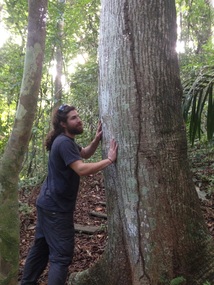 Matt exploring the tropical forest on his first day on Barro Colorado Island, Panama. (Photo by JD Herndon.)
Matt exploring the tropical forest on his first day on Barro Colorado Island, Panama. (Photo by JD Herndon.)
In Memory of Matthew S. Del Grosso (9/28/1990 – 5/21/2015)
Our hearts are heavy, but our spirits are brimful as we honor the memory of Ph.D. student Matt Del Grosso. Matt was only in the first year of his Ph.D. program at Utah State University, but his potential as a scientist was abundantly clear and the impact he made on our lives is immeasurable.
At the time of his tragic accident, Matt had only been back in Logan for ten days. We had just completed an extremely successful three month field season in Panama, where Matt had developed an original research program that integrated his interests in sexual selection, neurobiology, and molecular biology in the pursuit of understanding how social behavior evolves in bees. During the field season, Matt demonstrated his ability to juggle field and lab work while brainstorming new ideas and troubleshooting experimental design. He even developed a new research agenda of his own, implemented new experiments, and wrote a fellowship proposal in the midst of all of his field work.
Matt absolutely loved being in the tropical forest. We looked forward to an animated and exuberant “show and tell” of the discoveries Matt had made while canvasing the forest for bee nests each day. He even spent many of his “days off” in the forest – an opportunity most of the rest of us took to soothe our chigger and tick bites. Matt also made sure to savor all the new experiences the rest of Panama had to offer. He attended Carnival, swam in bioluminescent lagoons, snorkeled in Caribbean reefs, and developed close relationships with other field biologists from around the globe.
Matt never ceased to find wonder and excitement in his experiences, regardless of his surroundings. He relished in the adventures that Utah’s unique landscape had to offer, the promise of fossils that had yet to be found, and the bounty of B-movies and zombie books that offered journeys of the type science and nature did not provide. In this way, Matt’s spirit captured all of us. He was somehow both fully present in the moment and excitedly anticipating the future with seemingly endless passion and enthusiasm. His open-mind, positive outlook, and kind heart seemed to be contagious, for Matt’s presence consistently brightened everyone’s day.
We were unbelievably lucky to have shared a small portion of Matt’s life with him. His legacy will live on in our lab as we remind ourselves to seek out and savor the everyday adventure that life and scientific discovery have to offer.
Our hearts are heavy, but our spirits are brimful as we honor the memory of Ph.D. student Matt Del Grosso. Matt was only in the first year of his Ph.D. program at Utah State University, but his potential as a scientist was abundantly clear and the impact he made on our lives is immeasurable.
At the time of his tragic accident, Matt had only been back in Logan for ten days. We had just completed an extremely successful three month field season in Panama, where Matt had developed an original research program that integrated his interests in sexual selection, neurobiology, and molecular biology in the pursuit of understanding how social behavior evolves in bees. During the field season, Matt demonstrated his ability to juggle field and lab work while brainstorming new ideas and troubleshooting experimental design. He even developed a new research agenda of his own, implemented new experiments, and wrote a fellowship proposal in the midst of all of his field work.
Matt absolutely loved being in the tropical forest. We looked forward to an animated and exuberant “show and tell” of the discoveries Matt had made while canvasing the forest for bee nests each day. He even spent many of his “days off” in the forest – an opportunity most of the rest of us took to soothe our chigger and tick bites. Matt also made sure to savor all the new experiences the rest of Panama had to offer. He attended Carnival, swam in bioluminescent lagoons, snorkeled in Caribbean reefs, and developed close relationships with other field biologists from around the globe.
Matt never ceased to find wonder and excitement in his experiences, regardless of his surroundings. He relished in the adventures that Utah’s unique landscape had to offer, the promise of fossils that had yet to be found, and the bounty of B-movies and zombie books that offered journeys of the type science and nature did not provide. In this way, Matt’s spirit captured all of us. He was somehow both fully present in the moment and excitedly anticipating the future with seemingly endless passion and enthusiasm. His open-mind, positive outlook, and kind heart seemed to be contagious, for Matt’s presence consistently brightened everyone’s day.
We were unbelievably lucky to have shared a small portion of Matt’s life with him. His legacy will live on in our lab as we remind ourselves to seek out and savor the everyday adventure that life and scientific discovery have to offer.
